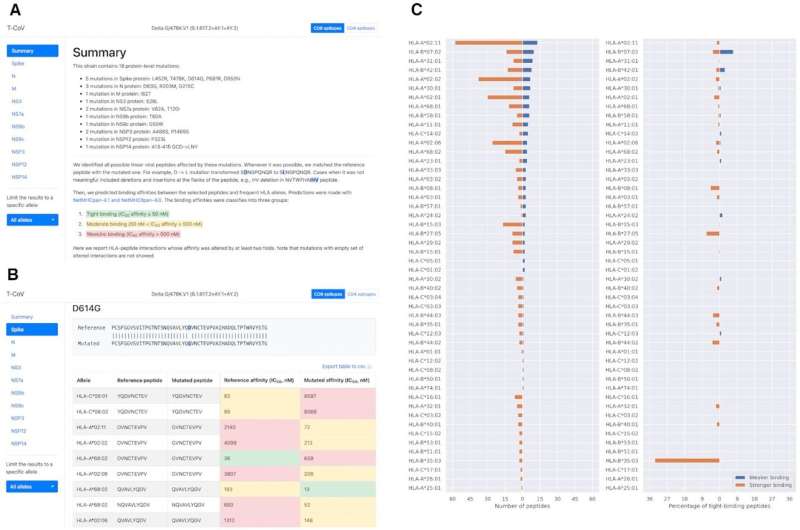
HSE University researchers assessed the effectiveness of the T-cell immune response to 11 variants of SARS-CoV-2. The researchers used their results to develop the T-cell COVID-19 Atlas portal (T-CoV). The findings have been published in Nucleic Acids Research.
The continuing emergence of new SARS-CoV-2 mutations allows the virus to spread more effectively and evade antibodies. However, it is unclear whether new strains are capable of evading T-cell immunity— one of the body’s main lines of defense against COVID-19.
The development of a T-cell immune response is largely governed by genetic factors, including variations in the genes of the major histocompatibility complex (also known as HLA). Each HLA gene variant has a corresponding molecule that identifies a specific set of peptides (protein) of a virus. There are a huge number of such gene variations, and each person has a unique set of them.
The effectiveness of the development of T-cell immunity to COVID-19 strains varies from person to person. Depending on the set of HLA molecules, some people’s immune systems will identify and destroy a mutated virus with the same efficacy as they would the base form of the virus. In others, the response is less effective.
The research was carried out by a group of scientists from HSE University’s Faculty of Biology and Biotechnology and the Institute of Bioorganic Chemistry of the Russian Academy of Sciences, including Stepan Nersisyan, Anton Zhiyanov, Maxim Shkurnikov, and Alexander Tonevitsky. They assessed the genetic features of the development of T-cell immunity to 11 main SARS-CoV-2 variants by analyzing the most common HLA gene variants. The researchers used their results to develop the T-cell COVID-19 Atlas portal (T-CoV, https://t-cov.hse.ru).
The researchers used bioinformatics to assess the binding affinities of hundreds of HLA molecule variations and tens of thousands of virus peptides of the main SARS-CoV-2 variants (Alpha, Beta, Gamma, Delta, Epsilon, Zeta, Eta, Theta, Iota, Kappa and Lambda). The team identified the HLA alleles that displayed the most significantly changed set of identified virus peptides. According to the scientists, mutated variants may pose a higher risk to people with these alleles.
Source: Read Full Article
